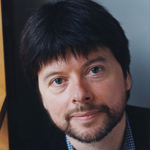Since Ken Burns first collaborated with Gerald Early, PhD, the Merle Kling Professor of Modern Letters in Arts & Sciences, as a consultant on his 1992 documentary, Baseball, the two have enjoyed a fruitful working relationship. Over the past 20 years, Early has made his mark on five of Burns’ films. (The fifth, The Roosevelts, has yet to air.)

This relationship makes the awarding of Washington University’s 2012 International Humanities Medal to Burns all the more special for Early, and for David and Phyllis Wilson Grossman, who established the medal and its accompanying Washington University Humanities Prize. The cash prize of $25,000 is given in honor of a person whose humanistic endeavors in scholarship, journalism, literature or the arts has made a permanent impact on U.S. society.
On Friday, Nov. 16, the public is welcome to attend the ceremony, followed by Burns’ Assembly Series presentation and book signing. The event, sponsored by The Center for the Humanities and the University Libraries, begins at 5 p.m. in the university’s 560 Music Building, 560 Trinity Ave. in University City.
This is a location change from the previously announced venue. A courtesy shuttle service will run from the Brookings Hall stairs to the 560 Music Building between 3:30 and 7:30 p.m. Parking is also available at the site. See below for details and directions.
Burns’ presentation includes a special treat for fans — a preview of three films yet to be seen: The Dust Bowl, which airs Nov. 18), The Central Park Five and The Roosevelts. He also will offer insight into his work.
Burns rose to prominence with the debut in 1990 of The Civil War, which aired on PBS stations. Over the course of 30-plus years and more than 20 documentaries, Burns’ films have illuminated the country’s past and brought history to life through techniques such as first-person narration. From Baseball to The National Parks, from Frank Lloyd Wright to Mark Twain, his creations have come to virtually define American culture.
So American, in fact, that Early sees a kinship to a great American voice from an earlier time.
“I like to think of Burns as a sort of poet, in some measure, the filmmaker version of Walt Whitman with his broad American canvas, the sweeping pile-on of images,” Early says.
For more information, visit one of the following websites: assemblyseries.wustl.edu, cenhum.artsci.wustl.edu/, libraries.wustl.edu/, or call (314) 935- 5576.